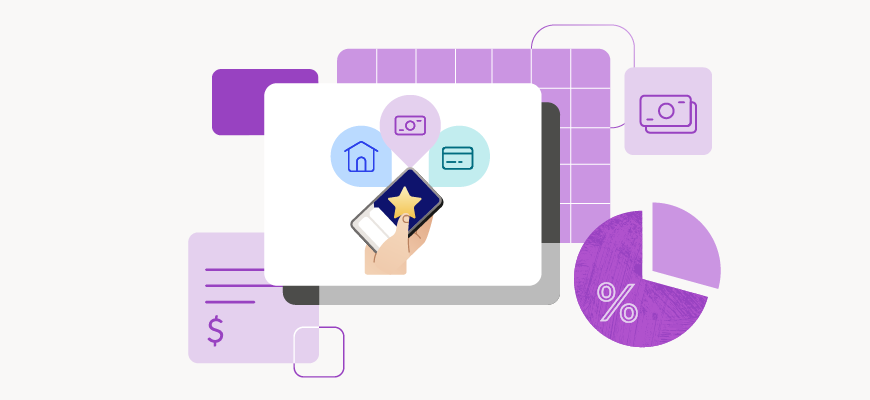Have you ever applied for a loan or a credit card only to receive an “Insufficient credit history” response from the lender? This scenario can happen if the lender looks at your credit history and decides that there’s not enough information about you to approve your application. You might not have enough credit accounts, or you might not have had your accounts for long enough for the lender to get a good sense of your debt-repaying habits.
Fortunately, building up a credit history isn’t too complicated or difficult. There are several different approaches you can take, however they all work the same way: they allow you a bit of credit so you can prove that you are a reliable borrower who pays your debts on time.
Some easy ways to build your credit include asking someone to add you as an authorized user to their credit card, signing up for a secured credit card, or taking out a credit builder loan. No matter your approach, you should always pay your bills on time.
We’ll get into more details about each of these (and more) below. Read on to learn how you can build a credit history that makes you attractive to lenders.
What Does Insufficient Credit History Mean?
Basically, if a lender tells you that you have an insufficient credit history, they’re saying that they don’t have enough information to decide if you can be responsible with credit. Lenders use the information in your credit history, such as whether you pay your bills on time and if you ever miss payments, to predict what you’re likely to do in the future. They get this information from Canada’s credit bureaus: Equifax Canada, TransUnion, and Dun & Bradstreet.
Without information about your past debt behaviour, you might have a hard time with the following:
Getting Approved for Credit CardsWithout a credit card, it’s challenging to do everyday things like rent a car, book a hotel room or do any kind of online shopping. Unfortunately, if you don't already have a credit history, you may not be able to get a credit card. And, even if you can get a credit card with your current limited credit, you’ll likely have to pay a higher interest rate on your purchases than someone with a long, solid credit history.
Getting Approved for LoansWithout a good credit history, it will be harder for you to get a loan for a car, home repairs, your education, and more. Like with credit cards, if you get a loan, you will likely have to pay higher interest rates than someone with a long history of good credit. This can make it even more challenging to pay off your debt quickly and get ahead financially.
Signing a Rental AgreementLandlords may be reluctant to rent you a house or apartment if they don’t see a good credit history on your credit report. They may require a larger security deposit if they decide to rent to you. The landlord might also insist on a co-signer or guarantor to ensure that if you miss a payment, there will be someone else to cover it. For example, if you are a university student and don’t have a long credit history yet, the landlord may ask that one of your parents put their name on the lease as well.
Taking out a MortgageIf you don't have enough credit history, it can be challenging to get a mortgage – mortgage lenders want to see a history of on-time payments so they can be reasonably confident that you will make your mortgage payments on time.
It might be hard to get approved, or you may have to pay a higher interest rate if you are approved. This can make it difficult to afford your mortgage payments, extend the amount of time it takes you to pay off your mortgage and, in extreme cases, could lead to foreclosure.
How to Fix Insufficient Credit History
Fortunately, insufficient credit history isn’t that hard to fix. It just takes a little time and dedication. Here are a few things you can do to start working on your insufficient credit history:
Open a New Credit AccountOpening a new credit account is one way to help build your credit history. Making on-time payments and keeping your balances low can show lenders that you are a responsible borrower. Additionally, having a mix of different types of credit can also benefit your credit score.
Opening a new account is an excellent way to get started if you don't have any credit history. You can start with a secured credit card or a small personal loan. Once you have established a history of making on-time payments, you may be able to qualify for traditional credit products like credit cards and auto loans.
Become an Authorized UserAnother option is to become an authorized user on someone else's credit account. This means you will have access to the credit card account and can use it to make purchases, but the account owner is ultimately responsible for making the payments.
Becoming an authorized user is helpful because you can piggyback on the credit history of the account owner. This can help you build up a good credit history faster than if you were to open a new account on your own.
It's important to note that you should only become an authorized user on an account in good standing. This means that the account owner has a history of making on-time payments and keeping their balances low. If the account owner has a poor credit history, it could actually hurt your credit score.
Overall, becoming an authorized user is an excellent way to build your credit history if you are looking for a fast and easy option.
Apply for a Credit Builder LoanAnother option for building your credit history is to apply for a credit builder loan, like the one offered by Borrowell. As the name implies, this type of loan is specifically designed to help people build their credit.
A credit builder loan is more like a savings program than a traditional cash loan, primarily because you don’t receive any money upon approval. You make payments every month which are reported to the credit bureaus and then, at the end of the term, a lump sum is returned to you.
The advantage of a credit builder loan is that it can help you build your credit history even if you have no credit history at all, by allowing you to build up a history of on-time payments, which is the biggest factor that determines your credit score.
Apply for a Secured Credit CardIf you are looking to build your credit history, one option is to apply for a secured credit card. A secured credit card is a type of credit card that requires you to put down a cash deposit as collateral. The deposit serves as security in case you default on your monthly payments.
So, if you wanted to spend $500 with your secured card, you would need to put up $500 cash as a deposit. The credit card company won't extend your credit without collateral until you build up that credit history.
Just like with the credit builder loan, making regular, on-time payments is essential to improving your credit score, and you will need to keep your balances low to avoid paying high interest charges.
Pay Your Bills on TimePaying your bills on time is one of the best things you can do to build your credit history. This includes everything from your credit card to your hydro bill to your cell phone bill. Even payments to insurance companies will affect your rating. Whenever you make a payment on time, it gets reported to the credit bureaus and counts towards your credit score.
There are a few different ways you can make sure you're paying your bills on time. One is to set up automatic payments with your lender. This way, you'll never have to worry about forgetting a payment.
Another option is to set up reminders for yourself. You can do this by setting up calendar alerts or using a phone app. Whichever method you choose, just make sure you remember to pay your bills on time, as even one missed or late payment can have a considerable negative impact on your credit score.
Report your Utility Bill and Rent Payments to Credit BureausWhile paying your utility bills won’t typically impact your credit score, you can request that your utility company report your payments to one of the credit bureaus.
Furthermore, some landlords will report your rent payments to the credit bureaus if you ask them to. You can also sign up for a rent payment reporting service, like the one offered by Borrowell. These services will report your rent payments to the credit bureaus on your behalf, so that you can build up your credit history by paying your rent every month.
Use a Credit Monitoring ServiceYou can use a credit monitoring service like Borrowell to keep track of your progress and check your credit. This can help you see how your efforts are paying off and what else you need to do to build and improve your credit history.
There are two kinds of credit checks:
A hard credit check, also known as a hard inquiry, is when a lender pulls your credit report to make a lending decision. This can happen when you're applying for a loan, credit card, or another type of credit. Hard inquiries can stay on your credit report for up to three years, but they generally only impact your score for the first year.
Too many hard inquiries can signal to lenders that you are in a lot of debt and desperate for credit, so if you plan on applying for a number of credit products, make sure to stagger your applications.
On the other hand, a soft credit check is when a lender (or yourself) checks your credit report but doesn't make a lending decision. This can happen when you're simply checking your own credit score or when a company is trying to pre-qualify you for a product. Soft inquiries generally don't impact your credit score.
Ready to get your credit score?
Sign up for Borrowell to get your free credit score. That's right. For free.
Get Your Credit Score
Consider working with a credit counselling or credit repair service. These services can help you improve your credit history by disputing errors on your credit report or helping you develop a plan to pay off your debts. The government of Canada has some helpful resources to help you find reliable credit counselling.
Build Your Own Credit HistoryIf your credit cards, mortgage, and loans are all in your spouse’s or family member’s name, then it’s time to sign up for your own. You might be paying these bills every month, but without your name on the documents, it won't go towards your credit history or score.
How Long Does it Take to Fix Insufficient Credit History?
It can take a few months before you start seeing results from your credit-building efforts. However, the time it takes to build your credit history will vary depending on several factors, such as your spending habits and which method(s) you choose to build your credit.
The bottom line is that there's no single answer to this question. Building your credit history is a process, and it will take some time to see results.
How to Get Approved for a Credit Card With Insufficient Credit History
If you have little or no credit history, getting approved for a regular credit card might be hard. Credit card companies want to know that you have good credit before they extend you credit. They want to know that you will not max out your card without being able to pay off that debt later. Thankfully, there are a few things you can do to improve your chances of getting approved.
One thing you can do is apply for a secured credit card. This type of credit card requires you to put down a deposit, which is then used as your credit limit. Because the issuer has less risk, you're more likely to be approved for a secured card. Make sure you choose a card with no or low fees and interest rates.
Another option is to apply for a credit card with a cosigner. This means someone else will be responsible for your debts if you can't pay them off. Cosigners can be family members or friends, as long as they have good credit. This option can be a great way to get approved for a credit card, but it's important to remember that you'll be putting someone else's credit at risk.
Is Insufficient Credit History The Same As Bad Credit History?
No, insufficient credit history is not the same as bad credit history. Having insufficient credit history means you don't have enough information for lenders to assess your creditworthiness properly.
You might have an insufficient credit history because you’re a young person who
has never taken out a loan or used a credit card. You might also be a newcomer to Canada or a previously incarcerated person.
On the other hand, having bad credit history means you have a history of making late payments or defaulting on loans. This is information that lenders can use to assess your creditworthiness, and it likely means you have a lower credit score.
Pay your bills on time to make sure your credit score remains high. This can include things like rent, utilities, and cell phone bills. If you're habitually late with these payments, it can hurt your credit score.
Another way to get bad credit is by using too much of your available credit. This is also called your credit utilization ratio. If you have a credit card with a $1,000 limit and you're carrying a balance of $500, your credit utilization ratio is 50%. The higher your credit utilization ratio, the more it will hurt your credit score, so make sure to monitor how close your spending gets to your credit limit. We recommend aiming to keep your balance below 30% of your limit.
You can fix both credit situations, but it’s much easier to build up a credit history than to improve poor credit history.
Insufficient Credit History vs. Insufficient Funds
Insufficient credit history and insufficient funds are two very different things. Insufficient credit history means you don't have enough information for lenders to assess your creditworthiness properly. On the other hand, insufficient funds means you don't have enough money in your account to cover a transaction.
The Bottom Line
It can be difficult to obtain credit if you have no credit history. Lenders are often reluctant to extend credit to people with no track record of repayment. This can make it challenging to qualify for a loan, rent an apartment, or even get a cell phone plan.
However, you can do a few things to try to build your credit history. Applying for a secured credit card, becoming an authorized user on someone else’s credit card, or taking out a credit builder loan can all help you build up your credit history. Additionally, paying your bills on time is one of the best ways to improve your credit score. By following these guidelines, you can slowly but surely build up your credit history and improve your chances of being approved for loans and other forms of credit in the future.













